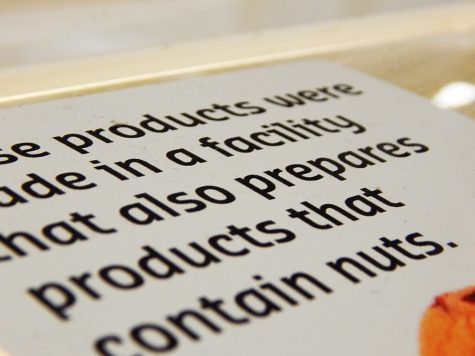New Allergen Warning in Dining Halls
September 30, 2018
 Clara Martorano
Clara Martorano
Until this semester, allergen warnings were not mandated across campus in bakery areas to warn that items are made in a facility with peanuts and tree nuts.
Although these previously optional signs were present in some dining halls before this year, all are now required to inform students of the risks associated with bakery items made in the Redstone Bake Shop, UVM dining dietician Nicole Rohrig said.
“We purchase some batters and mixes from locations that, in their factories, also have nuts and tree nuts,” Rohrig said. “We really couldn’t guarantee that the batter wasn’t cross-contacted before it even got to us.”
The decision to standardize those signs came because Rohrig felt she was not reaching enough students with allergies to warn them since few students meet with her to discuss strategies for safe dining on campus, she said.
First-year Gracie Rizo, who is allergic to almonds, said she makes a habit of checking the allergens of the food she eats. Overall, she feels confident in the safety of the foods she eats, Rizo said.
“For most things I am pretty confident they don’t have almonds in them, like I am pretty sure french fries don’t have almonds in them,” she said.
Just looking at the signs listing the allergens in each of the dishes is not enough for those with severe allergies, Rohrig said.
“There is always some level of risk of cross contamination in all areas of the dining hall, whether it be from the food distributor, in the kitchen or from contact with other students,” she said.
Some dining halls, like Harris-Millis Dining Hall, do have signs that state that there is a risk of cross contamination, Rohrig said. The signs should be consistent but that may not always be the case if they fall down or get moved, she said.
Resident district manager, Melissa Zelazny thinks people know dining halls are not nut free facilities, she said.
“We’re not a nut free facility and I think that’s the point of the thing,” Zelazny said.
All kitchen employees are trained to manage allergens by taking preventative measures against cross contamination, Zelazny said.
“So if they have a risk of cross contact on the buffet line, if any of those dishes have nuts let’s say or gluten, then they should not be eating off that line,” Rohrig said. “They should be communicating with somebody and get it from the back from a clean pan.”
When it comes to putting out allergen warning signs about cross contamination in the bakery, that is up to the staff at dining halls to do, Rohrig said.
“I’ve given them the resources, and it’s their responsibility to take care of it from there,” she said.
Dining hall staff try to double check if the cross-contamination warning cards get worn out or lost, Zelazny said.
“If there’s a label it’s your responsibility to read it,” she said.
The safest options for students with allergies are the Simple Servings station in Central Dining Hall and Harris-Millis Dining Hall, as well as MyZone, which is located in all dining halls, Rohrig said.
Simple Servings is free of the top seven of allergens, she said. The top eight allergens are milk, eggs, peanuts, tree nuts, fish, shellfish, wheat and soy, according to the Mayo Clinic’s website.
MyZone is a gluten-free and nut free area with vegan options that has baked goods, Rohrig said.
“The MyZone is not intended to be a meal — I would say that it’s probably most helpful at breakfast,” she said.
Rohrig’s information is on flyers around campus and on the electronic screens at Central Campus Dining Hall for students to see and contact her about nutrition concerns, she said.
Rohrig does more than 20 tabling events per year, she said.
The Dining Advisory Board is looking for a student with allergies to represent that population for them in their decision making process, Rohrig said.






